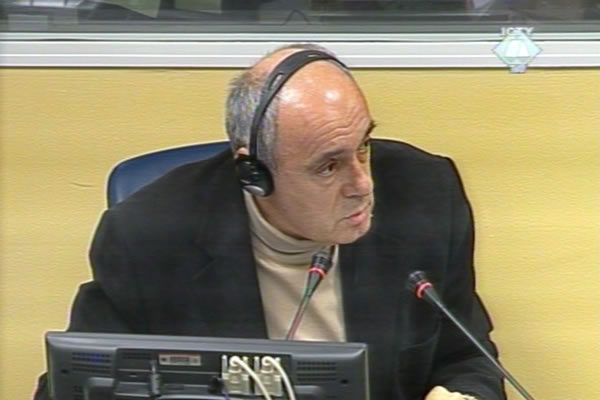Home
REAL FEAR ON FALSE PREMISES
According to Croatian professor Zarko Puhovski, who continues his evidence at the trial of generals Gotovina, Cermak and Markac, crimes against Serbs who didn’t flee Krajina after Operation Storm showed that the fear of those who had fled on time – before the arrival of the Croatian Army – was ‘absolutely real’ although it was based on false premises and Serbian media propaganda
 Žarko Puhovski, svjedok na suđenju Anti Gotovini, Ivanu Čermaku i Mladenu Markaču
Žarko Puhovski, svjedok na suđenju Anti Gotovini, Ivanu Čermaku i Mladenu Markaču As the examination-in chief of Zarko Puhovski, University of Zagreb professor, drew to a close at the trial of Croatian generals Gotovina, Cermak and Markac, prosecutor Ruth Frolich showed several clips from a documentary Storm over Krajina directed by Bozidar Knezevic in 2001. The documentary speaks of crimes against Serb civilians – with which the three generals are charged – during and after Operation storm in August 1995. Puhovski, who also appears in the film, was the president of the Croatian Helsinki Committee at the time when the documentary was made. During Operation Storm, the witness was the vice-chairman of the Croatian Helsinki Committee.
Commenting on the footage showing refugee columns, the witness repeated what he had said in the film: those who fled before the Croatian Army and the police ‘were right to be afraid’ even though they were afraid ‘for wrong reasons’; they believed the Serbian media propaganda about the Croats’ bad intentions. The fate of those who stayed proved that the fear of those who had fled before the arrival of the Croatian Army ‘was absolutely real’. In the days following Operation Storm, the Croatian TV reports painted a rosy picture of the situation in the field, Puhovski added. The TV showed Croatian soldiers as better mannered than any other army. On the other hand, the Croatian Helsinki Watch activists ‘constantly received completely opposite reports’ from people in the columns who were stoned and abused despite the military and police escort.
In the first part of the cross-examination, Ivan Cermak’s counsel tried to contest the reliability of the allegation that the crimes against Serbs in Krajina were reported by several Croatian Helsinki Committee teams on ‘fact-finding missions’. Those allegations were the foundations of the final report drafted and published in 1999. Defense counsel Higgins noted that the report was based on the statements of persons whose full names were not provided: this made it difficult to verify the facts. The witness admitted that he couldn’t divine the names of the persons listed as sources with only their initials provided. However, nobody has contested the findings of the Croatian Helsinki Committee in the past 10-odd years the report has been available to the public, Puhovski said. When asked why there had been no experts in the HHO teams – such as a forensic expert, pathologist or ballistic expert, Puhovski said that it was not exactly safe to go to Krajina after Operation Storm and experts ‘are usually not very brave’.
According to the defense, the other controversial point is Puhovski’s conclusion that in the summer of 1995 in Knin, Ivan Cermak was ‘the man everyone went to for everything’. The witness agreed that he hadn’t met the accused general. However, the Croatian Helsinki Committee teams reported to Puhovski that the local officials in the field always replied to ‘more difficult questions’ that they had to ask Cermak. When asked if he knew that Cermak had been the Knin Garrison commander, Puhovski said that he never learned what his formal title had been. However, Puhovski clarified, Cermak was often casually referred to as ‘the military commander’ or just ‘the boss’.
As the hearing today drew to a close, Gotovina’s defense counsel Luka Misetic began his cross-examination of the witness.
Linked Reports
- Case : Gotovina et al. - "Operation Storm"
- 2009-02-12 PUHOVSKI: ‘OPERATION STORM EFFECTS TANTAMOUNT TO ETHNIC CLEANSING
- 2009-02-03 LAUSIC COMPLETES HIS EVIDENCE
- 2009-02-02 WITNESS: 'CERMAK COMMANDED MILITARY POLICE TOO'
- 2009-02-16 GOTOVINA'S DEFENSE: ‘OTHERS ARE GUILTY OF KILLINGS’
- 2009-02-17 DEFENSE: ' HHO REPORT ON CRIMES INFLUENCED BY FOREIGN DONORS’
- 2009-02-18 'POSSIBLE PROBABLE' RISK FOR CIVILIANS IN KNIN
